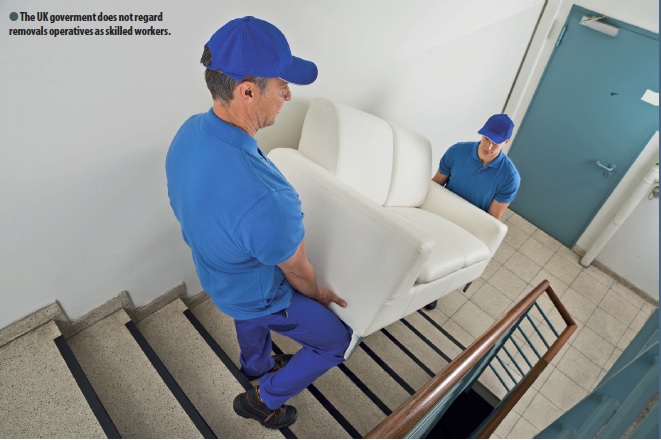Deputy Editor David Jordan looks at the UK’s proposals relating to the employment of foreign workers when the UK leaves the EU, deal or no deal.
 The Road Haulage Association (RHA) has warned that government plans to set an income-based threshold on immigration after the UK leaves the EU won’t meet the needs of business.
The Road Haulage Association (RHA) has warned that government plans to set an income-based threshold on immigration after the UK leaves the EU won’t meet the needs of business.
RHA Chief Executive, Richard Burnett has said an income-based immigration system will hit businesses, making it harder to recruit the staff they need to fill vital roles such as HGV drivers.
His remarks followed the publication of the government’s Immigration White Paper on 19 December, 2018 which announced plans to consult on setting a £30,000 minimum salary threshold on foreign nationals from the EU and elsewhere, wishing to work in the UK after Brexit.
If the plans go ahead the removals industry is likely to be particularly hit, not only because of the salary requirements but also the minimum education levels, which will also become part of the entry criteria. Hitherto, immigrants from countries outside the EU needed a minimum education attainment equivalent to National Qualification Framework (NQF) 6, which is degree standard. Under free movement there were no minimum education standards for EU nationals, but after Brexit that is set to change.
The Immigration White Paper has lowered the education requirement to NQF 3, but this still requires immigrants to have management experience and would typically, in the moving industry, apply to someone working as a transport or warehouse manager, or a similar role.
Surprisingly, the government does not regard HGV drivers and removal operatives as skilled and they are categorised as NQF 2 along with other manual workers, meaning foreign nationals will not qualify for employment in the UK. EU workers who have been resident in the UK for five years and have been granted ‘Settled Status’ will of course not be affected, but the ready supply of so-called low-skilled workers from Europe looks like coming to an end.
Part of the government’s thinking is to encourage companies employing cheap manual labour to invest in more automation to improve the UK’s GDP, currently lagging behind most other G7 countries. But while this may be possible in some industries, such as manufacturing, food production or warehousing for example, there are few opportunities to automate the removals industry. Moving Mr & Mrs Smith from Birmingham to Bristol has always needed people, and always will do.
Despite all the hype about self-driving vehicles I don’t believe automatous trucks will become a reality on our roads for many years to come, so the driver shortage is likely to be with us for the foreseeable future.
Somehow, we need to attract more British workers to our industry to fill the gap caused by the absence of migrant workers in the coming years. Doing so will not be easy, especially the recruitment of HGV drivers given the current estimated shortfall of around 50,000 across all transport sectors and the consequentially high wages paid by haulage companies.